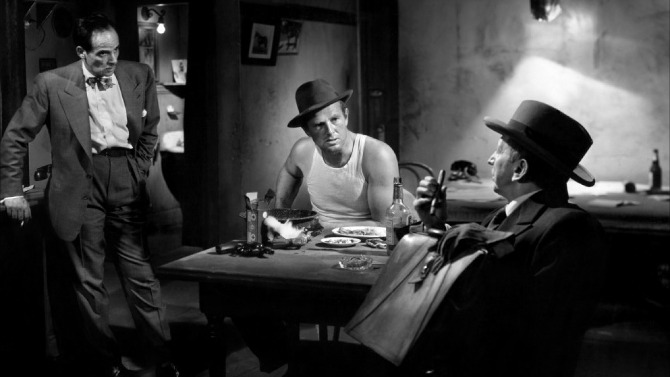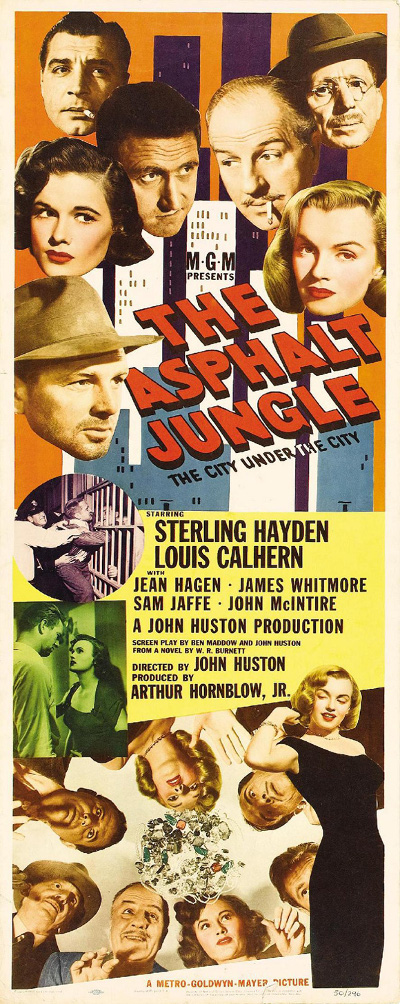Perhaps one of the best descriptive titles to ever come out of Hollywood is The Asphalt Jungle (even though it is the title of the book the film is based on). Directed by John Huston, the 1950 title vividly exemplifies film noir: a dark, gritty, dog-eat-dog world – its only difference from the animalistic wilderness is the stark stone and cement infrastructure that frames the vice-filled world.
Oh, and are there vices! Each character has his or her own cross to bear – dragging them down into a world of sin and sorrow. As Doctor Erwin Riedenschneider (Sam Jaffe), the mastermind of the heist, puts it: “One way or another, we all work for our vice”. Youthful gals, wealth and extravagance, liquor, gambling on the horses, and an infatuation for a specific man are just some of the misdeeds you’ll find in this movie.
The above mentioned Doctor, recently released from prison, has devised an intricate heist – the take, at least one million dollars. Reaching out to a name he heard bandied about on the inside, he visits a bookie by the name of Cobby (Marc Lawrence). Needing the proper backing, a meeting is set between the man with the plan and a prominent, albeit shady lawyer, Alonzo Emmerich (Louis Calhern).
Forging a deal with the lawyer, the Doc begins to assemble his team. First, he woos talented safecracker Louie Ciavelli (Anthony Caruso), who promptly recommends his buddy Gus Minissi (James Whitmore), a diner owner with a malformed back, as the most reliable getaway driver. Unsure of who to hire as the ‘heavy’, Doc chooses a man he has only seen once (who barged in the first time he met with Cobby), intuitively picking him for the job. His name, Dix Handley (Sterling Hayden).
Though none of the characters are what we might call likeable, they are all clearly competent. The heist nearly goes off without a hitch, though chance does rear its ugly head at one point, putting a snag in the post operational plan. Though ill luck does play a certain part, it is the deplorable greed of an individual that I will not name that further complicates things. Will the team be able to split the payday, enjoying leisure for the rest of their lives, or will human frailty and fateful misfortune tear them down?
Chock full of superb performances, this was the film that put Marilyn Monroe on the map. Though only in a few sequences, she is an absolute scene stealer as the youthful mistress of the attorney. We can see here why she became typecast, as she is easily able to pull off that complicated grey area of ingenue and sexual powerhouse – somehow both innocent to the world as well as wise seductress. Clearly the marketing team was also impressed, as she graces the insert poster no less than three times (without receiving billing). Check out the poster to the right to see what I’m talking about. Similarly, the rest of the cast bring their A game. Hayden is the type of guy you wouldn’t want to cross – his sizeable frame and gruff demeanour makes him the perfect hooligan. Doll Conovan (Jean Hagan) is solid as the gal who is infatuated with Hayden’s Dix. She would follow him into any situation, no matter how precarious. Jaffe is stellar as the accented German Doctor, whose instincts are only outmatched by his smarts. Delivering some of the best dialogue, he throws out lines like: “Experience has taught me never to trust a policeman. Just when you think one’s alright, he turns legit.” Lawrence is also sharp as the twitchy, beady eyed Cobby, the bookie who seems to perspire more and more as the film goes on. Calhern, Caruso and Whitmore also do brilliant jobs bringing their characters to life.
With a knack for finding the perfect shot, two time Oscar winner John Huston (The Treasure of Sierra Madre, The Maltese Falcon, The African Queen) frames each sequence with a certain striking imagery, allowing the action to unfold in a way that is never over-edited.
In a somewhat bizarre manoeuver, composer Miklós Rózsa’s soaring score flows through the opening credits and slightly beyond, then disappears to allow the sounds of the city to take place. It is the manufactured world of the Asphalt Jungle that replaces the musical instruments with tools, sirens, jukeboxes, and so many other urban sounds. Then, 107 minutes later, it kicks back in, adding a punch to the final poignant scene. In all, a short six minutes of the movie features the score.
One of the more significant movies of the 1950s, it influenced future films and was even turned into a television series (a mediocre one). Also, you can clearly see a connection to the superb 1955 French caper Rififi – this superlative European heist film clearly drew from the 1950 offering. Interestingly, an impactful scene as the movie comes to a close influenced song writer Curly Putnam to scribe “The Green, Green Grass of Home”, which became a number one hit for Tom Jones in 1966. So, enter into the noirish landscape that is The Asphalt Jungle to discover whether those within it will ever find their way back to the green, green grass of home.


